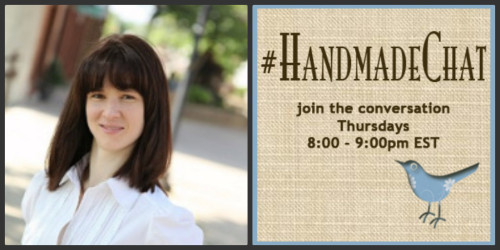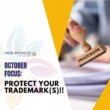On Thursdays, Indie Business Network hosts #HandmadeChat, a Twitter talk show to educate, train and inspire creative and artisan entrepreneurs to become profitable business owners. While the show is aimed mainly at entrepreneurs who make and sell handmade consumer products, the topics and discussions can empower and encourage the growth of any small business.

Our guest yesterday was Allison Kontur from Cuyahoga Falls, Ohio. Allison owns AliMar Labs, a privately held company offering a wide variety of stock personal care products for private label, as well as custom product development. Here is some of what Allison shared about how to use private label services to grow your business.
WHAT IS PRIVATE LABEL?
Allison Kontur: Private label companies make products, and then sell them to other companies, which then sell them under their own brand name. There are a few reasons why you might wish to use private label services instead of making your products yourself. First, if you cannot keep up with customer demand or you don't have the space to manufacture yourself, private label can help. Also, if you cannot make products by law where you are (for lack of proper licensing for example), having a private label company do it for you allows you to be in business without violating the law. Finally, if you want or need to expand your product line quickly for some reason, like the holiday rush, private label services can help you do that.
WHAT ARE THE PROS AND CONS OF USING A PRIVATE LABEL COMPANY TO MAKE YOUR PRODUCTS?
Allison Kontur: Private label allows you to market pre-manufactured, pre-tested products as your own. You can easily enhance and/or expand your company's product range without having to worry about making the products yourself. Private label services can save you time, money and effort as compared to product development from scratch. Tere are also low start-up costs and your private label manufacturer's experience limits your risk. You also enjoy higher profit margins and better control over inventory.
On the flip side, since not every manufacturer has experience with your specific type of product, you need to be very diligent in doing your research to find the right private label company for you. Private label manufacturers rarely produce the marketing and point-of-sale materials to promote your line of products, so you will need to develop these materials yourself. Minimum order requirements can be high, and the costs for even minor formulation tweaks can be quite high.
HOW IS PRIVATE LABEL DIFFERENT FROM CONTRACT MANUFACTURING?
Allison Kontur: In a contract manufacturing business model, you approach a contract manufacturer with your own product or formula and ask them to make it for you. The contract manufacturer will quote the job based on processes, labor, tooling, and material costs. For the agreed-upon price, the contract manufacturer acts as your factory, producing and shipping units of the product on your behalf.
A private label company, on the other hand, has a stock of formulas ready to be bottled and sold under your brand name.
ARE PRIVATE LABEL COMPANIES ONLY FOR COSMETICS?
Allison Kontur: No. You can find private label companies to manufacture almost any type of consumer product including food, dietary supplements and drugs. Private label companies usually specialize in a specific type of product. You would need a different private label manufacturer for cookies, for example, than you would for candles or jewelry. It is to your benefit to hire a private label company that specializes in the specific type of product you want to sell.
HOW MUCH SHOULD I EXPECT TO PAY IF I USE A PRIVATE LABEL COMPANY?
Allison Kontur: Cost is entirely determined upon the formulation itself, quantity purchased and the type of packaging you are using. Most private label companies offer multiple versions of a specific type of formula so you can select from a price range that fits your company. You need to factor in extraneous costs like label printing and application or special packaging to ship your product, if you choose fragile containers.
HOW DO I CHOOSE A PRIVATE LABEL MANUFACTURER?
Allison Kontur: You should choose a manufacturer based on the type of product you want manufactured (is it a cosmetic, drug or both …) and the minimums you are comfortable with. Not all manufacturers of cosmetics can manufacture an OTC drug like sunscreen, anti-perspirant or hand sanitizer (to name a few), so be sure to look out for that. Most manufacturers require minimums in the area of 5,000 units per product.
Make sure that the private label manufacturer you choose has experience with the products you want to sell. See that they have a good track record, so look them up with the Better Business Bureau or check the appropriate regulator's website to see if the company has received any warning letters or complaints. Also, ask if they can put you in contact with any of their customers so you can get recommendations. Be aware though that most customers don't want anyone to know how they use for private label manufacture, so don't be put off if it's not easy to get this kind of information.
Avoid manufacturers that don't fit your criteria. For example, if a private label company's order minimum is is 5,000 pieces and you know you can only move 500, keep searching. If a company tells you they manufacture only lip balm on a lanyard and you need lotion and liquid soap, move on.
DO PRIVATE LABEL COMPANIES REQUIRE THAT I GIVE THEM MY RECIPES? HOW DO I PROTECT THEM, IF SO?
Allison Kontur: A product that is private labeled is made from the manufacturer's recipe, so would not use your recipe. In a contract manufacturing arrangement, you share your recipe with the manufacturer, and they make it for you. In those cases, you'll need to make sure you have a non-disclosure agreement to protect your recipe and other confidential business information.
If you have a formula contract manufactured, you retain ownership of whatever information you brought into the manufacturing relationship. If that is a list of ingredients, you own it. If that is a list of percentages, you own it.
On the other hand, if the manufacture must “scale up” your formula to a larger batch to work with their large-scale equipment, or if tweaks must be made, the manufacturer owns any and all changes to that formula including the mixing instructions for making it using their equipment. You should negotiate with your manufacture to purchase these changes and instructions in the event you ever need to change manufacturers.
HOW DO CONSUMERS TYPICALLY REACT UPON DISCOVERING THAT MY PRODUCTS ARE NOT MADE BY ME?
Allison Kontur: Most consumers do no know that a product has been private labeled unless you tell them. Most manufacturers do not want anyone to know that they private label, and if they do, they don't want anyone to know who does the manufacturing. The manufacturer's name and address are not listed on your label, so all outward appearances indicate that you are the maker of the product. Major companies like Target, WalMart and Bath and Body Works have their products private labeled products all the time, but you would never know by looking at the label.
WHAT OTHER IMPORTANT CONSIDERATIONS ARE THERE?
Allison Kontur: Before you private label, you should have all of your extraneous business necessities in place. These include (but are not limited to):
– The brand name for the company and/or product line
– Your logo and all identity and branding materials
– Well designed labels and packaging design
– An understanding of FDA requirements for cosmetic labeling (or requirements in your industry)
– All marketing materials, like post cards, brochures, catalogs, etc.
– Product photography
– A clean and well-designed website
– Product liability insurance
– Business insurance
– On-going marketing strategies so you can keep your customers up to date and engaged
More About Allison Kontur
Allison Kontur is the owner of AliMar Labs, a Private label skin care and personal care manufacturer located in the historic, Riverfront district of Cuyahoga Falls, Ohio. They offer hundreds of in house skin care and private label formulas, in addition to contract manufacturing.
Connect with Allison:
Get information about Allison's webinar to help you launch your own private label program!
When Is The Next #HandmadeChat?
The next #HandmadeChat will be Thursday, June 6, 2013, at 8pm ET, with Jennifer Smith of Eco Office Gals, will share on the How To Build A Powerful WordPress Blog.
Here's how to participate in #HandmadeChat.
Take the #HandmadeChat Survey so we can make #HandmadeChat even better!
Follow #HandmadeChat on Twitter.



